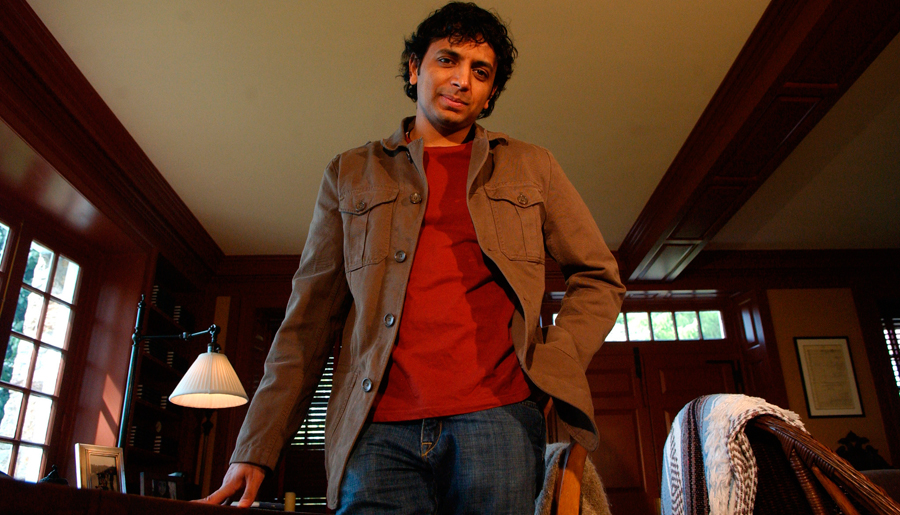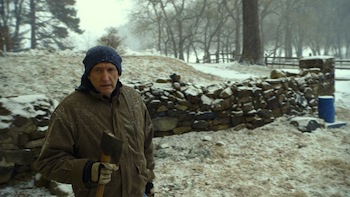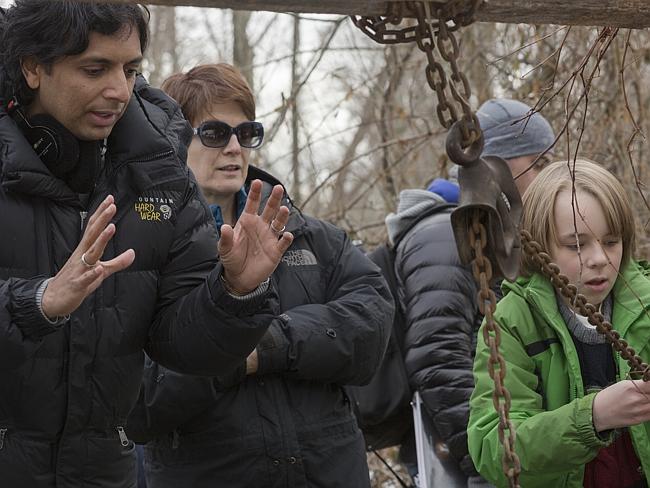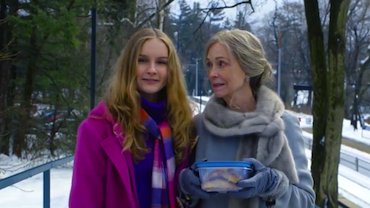GRANDMA'S BOY: THE M. NIGHT SHYAMALAN INTERVIEW
 Friday, August 28, 2015 at 12:03PM
Friday, August 28, 2015 at 12:03PM Few films in recent memory have buzzed with such cinematic brio as The Visit, the terrifyingly entertaining story of teenage documentarian Rebecca (Olivia DeJonge), her kid brother Tyler (Ed Oxenbould) and the unnerving week they spend with their off-kilter grandparents (Deanna Dunagan, Peter McRobbie). It is the latest vision from M. Night Shyamalan, the auteur whose blockbusters The Sixth Sense (1999), Unbreakable (2000), Signs (2002) and The Village (2004) saw a Newsweek cover label him "The Next Spielberg". Yet The Visit represents a bold departure for the 45 year-old; his chilling, blackly funny script is brought to life using first-person perspectives and handheld camerawork. It exists in that ‘found-footage’ realm, but both deconstructs and revitalises the genre. The morning after a crowd-pleasing preview in Sydney’s cinema district, M. Night Shyamalan sat with SCREEN-SPACE to discuss his latest work…

There is a clarity, a leanness, about the storytelling in The Visit. I sensed that you were having a lot of fun making this film…
I’m so close to it still, but it seems like the most fun I’ve had making a film. I think it tops the last ‘most fun’ experience I’ve had, which was Signs. I think in both films you can sense a kind of buoyancy that was coming from me, like I was goofing around and having a good time playing with the movie. I think good energy comes from that.
After more than a decade of big studio projects, were there habits you had to unlearn or techniques you had to reassess when shooting the smaller scale, ‘first-person’ perspective used in The Visit?
 I’m naturally a more intimate filmmaker. I think and view more in those terms. This idea of limitations and looking through one person’s perspective is naturally how I see things. Even when I’m shooting some big scene, with action and extras and all that stuff, I have to fight the instinct to see it as an intimate thing, to film it as one soldier’s perspective and examining it from the point of what they’re feeling. A story like this fits well for me, fits what I like to call the filmmaker's ‘accent.’ Some filmmakers are great journeyman directors. You hire them and they adapt and can be whatever you need them to be, but they don’t have a strong accent with the way they tell the story. In that way, The Visit is a really good match for me. I know I wrote it but I did that to match the story to my accent. I tend to come from a very optimistic place but do enjoy telling very dark stories, and my protagonists match that. (Pictured, above; Peter McRobbie as Pop-pop in The Visit)
I’m naturally a more intimate filmmaker. I think and view more in those terms. This idea of limitations and looking through one person’s perspective is naturally how I see things. Even when I’m shooting some big scene, with action and extras and all that stuff, I have to fight the instinct to see it as an intimate thing, to film it as one soldier’s perspective and examining it from the point of what they’re feeling. A story like this fits well for me, fits what I like to call the filmmaker's ‘accent.’ Some filmmakers are great journeyman directors. You hire them and they adapt and can be whatever you need them to be, but they don’t have a strong accent with the way they tell the story. In that way, The Visit is a really good match for me. I know I wrote it but I did that to match the story to my accent. I tend to come from a very optimistic place but do enjoy telling very dark stories, and my protagonists match that. (Pictured, above; Peter McRobbie as Pop-pop in The Visit)
In much of your work, your narratives centre on children in both lead roles (Wide Awake; The Sixth Sense; The Last Airbender; After Earth) and strong support parts (Signs). Why does childhood hold such a fascination for you?
It speaks to that period of time when we are growing up, let’s say between 10 and 15, that I find extraordinary but also sad and tragic. That’s when we stop believing, when we are throwing away childish beliefs and aspects of our imagination that help us be so present as children, and we start to believe instead in the real world. Those are sad moments. I spend a lot of time thinking about characters that are put in an extraordinary situation and then try to convince the adults, “Hey, something’s going on here.” And they are able to do this because they can still believe a little bit. I am anchored in that period because a lot of my movies are about faith and belief.
The casting of these two Australian actors, Ed Oxenbould and Olivia DeJonge, continues an incredible winning streak in your unearthing of child actors…
 Casting is so critical and it is a very hard skill set to learn. You have to see something in them that you are going to have to draw out. That may be something that they may not have necessarily given you in the auditions, but you have to see it in them somewhere. It is their anchor; they are pivoting their emotions off this anchor, and you have to be able to say, “Ok, that’s it.” That’s hard to do, especially when casting early on and the material is still forming. I was very lucky with Ed and Olivia. I always look for a handful of traits when casting kids. I need them to be super smart, because we are going analyse the craft of acting in such a deep way I have to be able to talk to them about it as if they were adults. Secondly, they have to be good people, because that is what I want to bring out of the characters. And the third thing, perhaps the most important thing, is their family situation. Their parents need to be people who I can talk to and I can respect, because it is a team game when working with a child actor; I’ll push them and push them and I’ll eventually need to go through the parents to get to them. (Pictured, above; Shyamalan, left, directing Ed Oxenbould on the set of The Visit).
Casting is so critical and it is a very hard skill set to learn. You have to see something in them that you are going to have to draw out. That may be something that they may not have necessarily given you in the auditions, but you have to see it in them somewhere. It is their anchor; they are pivoting their emotions off this anchor, and you have to be able to say, “Ok, that’s it.” That’s hard to do, especially when casting early on and the material is still forming. I was very lucky with Ed and Olivia. I always look for a handful of traits when casting kids. I need them to be super smart, because we are going analyse the craft of acting in such a deep way I have to be able to talk to them about it as if they were adults. Secondly, they have to be good people, because that is what I want to bring out of the characters. And the third thing, perhaps the most important thing, is their family situation. Their parents need to be people who I can talk to and I can respect, because it is a team game when working with a child actor; I’ll push them and push them and I’ll eventually need to go through the parents to get to them. (Pictured, above; Shyamalan, left, directing Ed Oxenbould on the set of The Visit).
When directors place a camera in their character's hands, it is an opportunity to comment on the nature of their craft. What does Becca’s attitude to film reveal about you?
You know, both the kids represent two sides of me. Becca is kind of in awe of the art of filmmaking and an aspiring artist, even when it tips over into pretension or into a dogma about it, a pompousness that is stiff and unwavering. I feel all those things about filmmaking. Then there is the other side, that being ‘the entertainer’ and that’s Ed. Sometimes I just want to be a mischievious kid, capturing something shocking on film.
The core emotional arc in The Visit is about a family’s generational divide. How did this form?
 Every story I write, I glimpse scenes and dialogue that ultimately pose the question, “What is the film about?” There’s a unifying thematic theory underneath it all, so that every scene represents a goal, one same thing. The Visit is about forgiveness. What happens when we do forgive, or when we don’t forgive. There’s a lot of pain in all the backstories of all the characters; the mum and her parents, or the kids and their dad. They are being juxtaposed throughout the film. When we don’t forgive, we eventually have to consider the years that are lost, the love that lost, the opportunities that are lost. That is the lesson that Becca comes to learn. (Pictured, above; Olivia DeJonge as Rebecca, left, and Deanna Dunagan as Nana in The Visit).
Every story I write, I glimpse scenes and dialogue that ultimately pose the question, “What is the film about?” There’s a unifying thematic theory underneath it all, so that every scene represents a goal, one same thing. The Visit is about forgiveness. What happens when we do forgive, or when we don’t forgive. There’s a lot of pain in all the backstories of all the characters; the mum and her parents, or the kids and their dad. They are being juxtaposed throughout the film. When we don’t forgive, we eventually have to consider the years that are lost, the love that lost, the opportunities that are lost. That is the lesson that Becca comes to learn. (Pictured, above; Olivia DeJonge as Rebecca, left, and Deanna Dunagan as Nana in The Visit).
Prior to the screening last night, you made some very passionate points about the value of seeing films like The Visit as a shared, communal experience…
It is everything to me, that’s why I do what I do. Whenever someone tries to suggest that we can release across all these platforms, I just say, “No!” When I saw Raiders of The Lost Ark, I remember thinking, “Wow, this is it.” I saw it in an old theatre, something like 1500 seats, a sold-out session; I couldn’t sit with my friends. The experience I had bordered upon religious (laughs). And I use that word because it was like a group hysteria was happening. I was transported; this enormous crowd was transported. Now would I want to watch Raiders… for the first time, alone on my couch in my den? That’s sad! I would have been denied that shared experience. It is one of my great memories, seeing those great movies in great movie theatres. With The Visit, I was determined to make every gasp, every laugh, a crucial part of that shared experience. It is a film that is really about the responsibilities we, the filmmakers, take on when we choose to tell our stories to a group of strangers.
The Visit opens in US theatres on September 11; the film opens in Australia on September 24. Check local listings for other territories.
